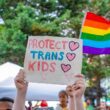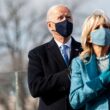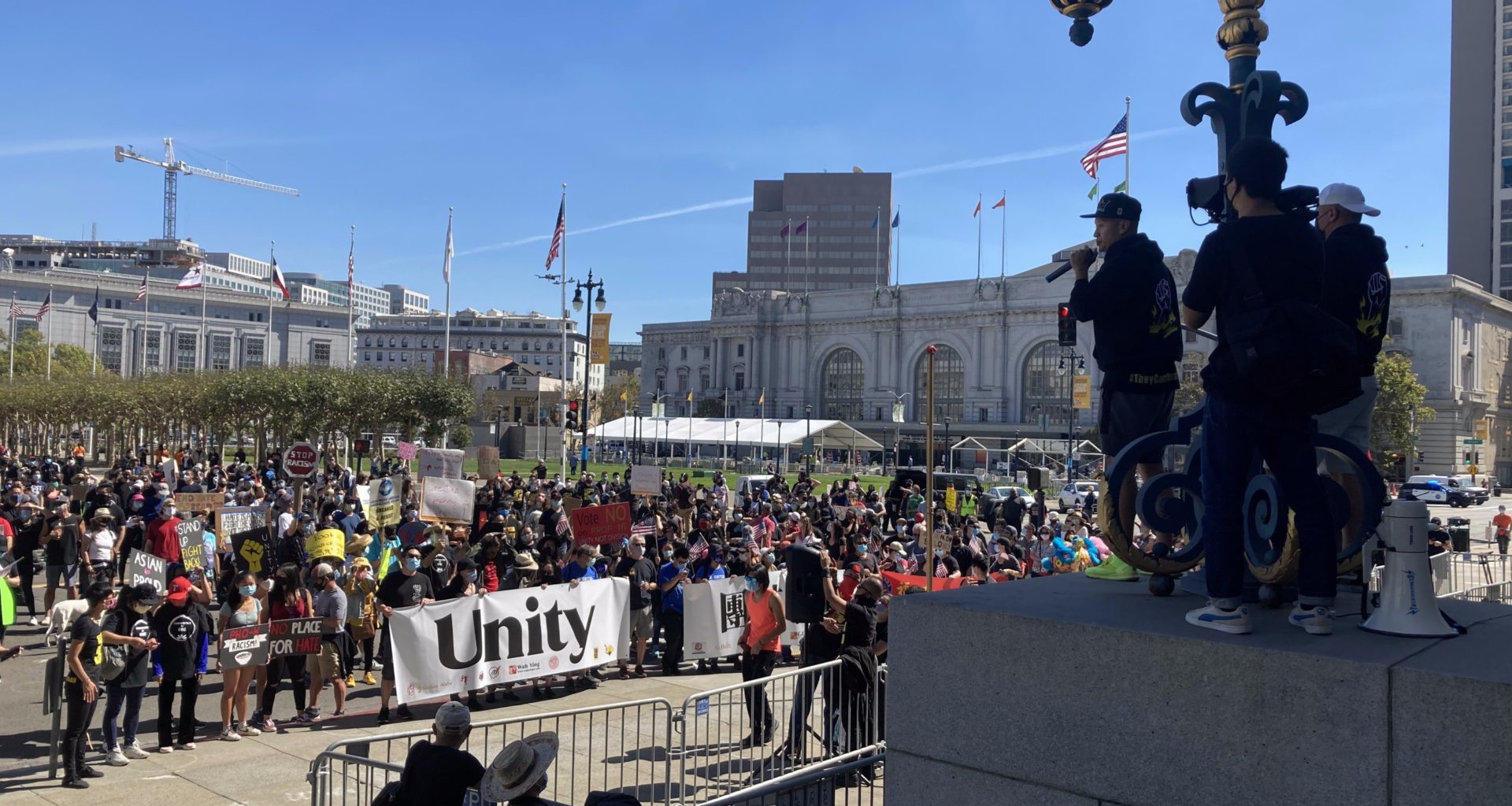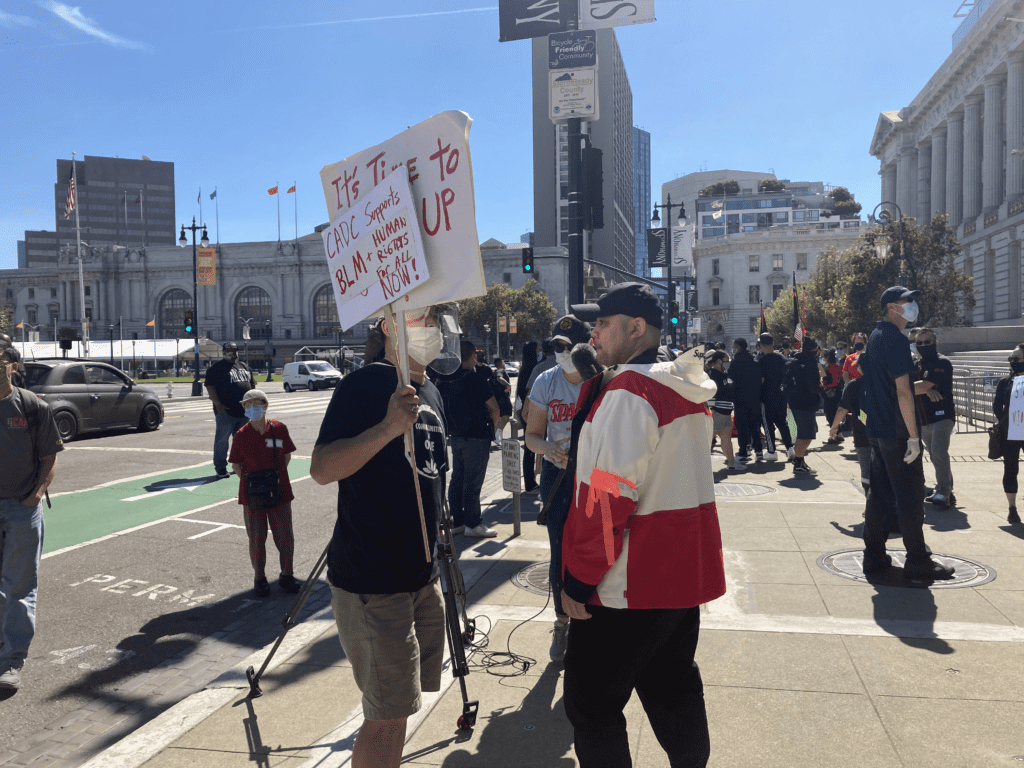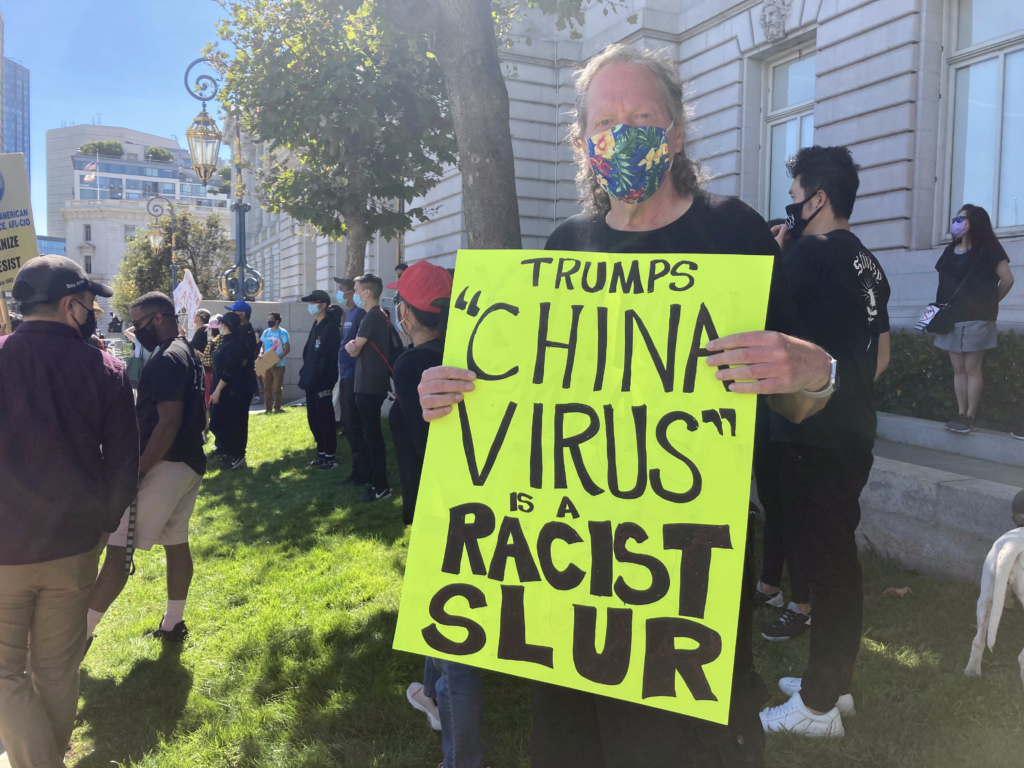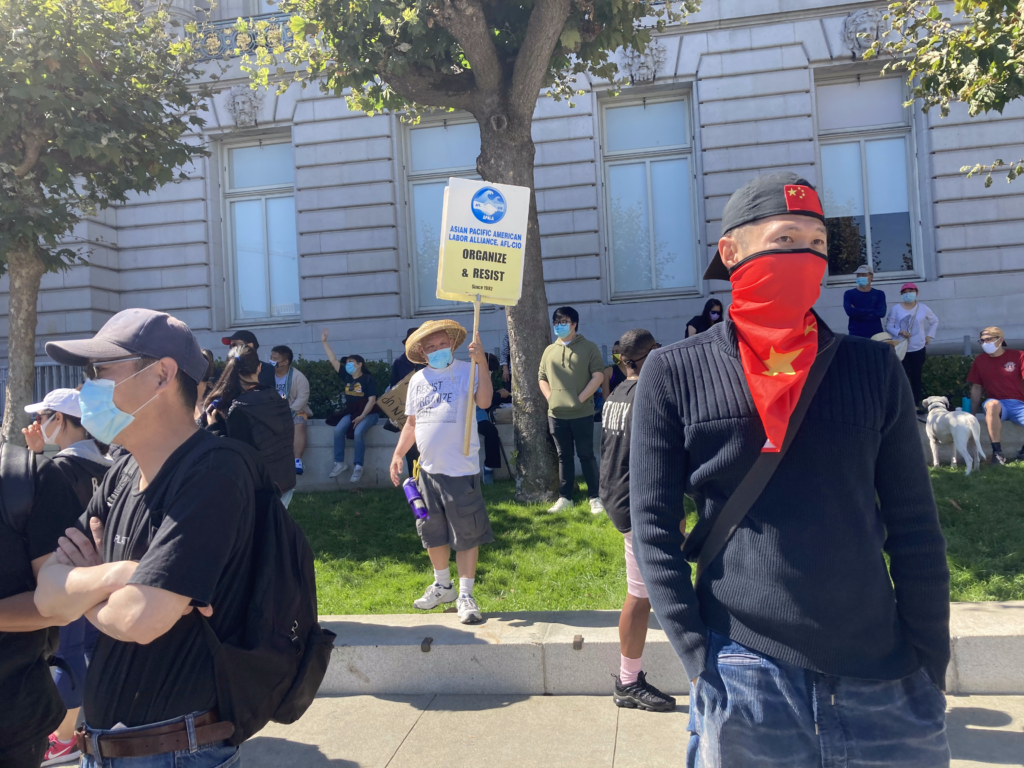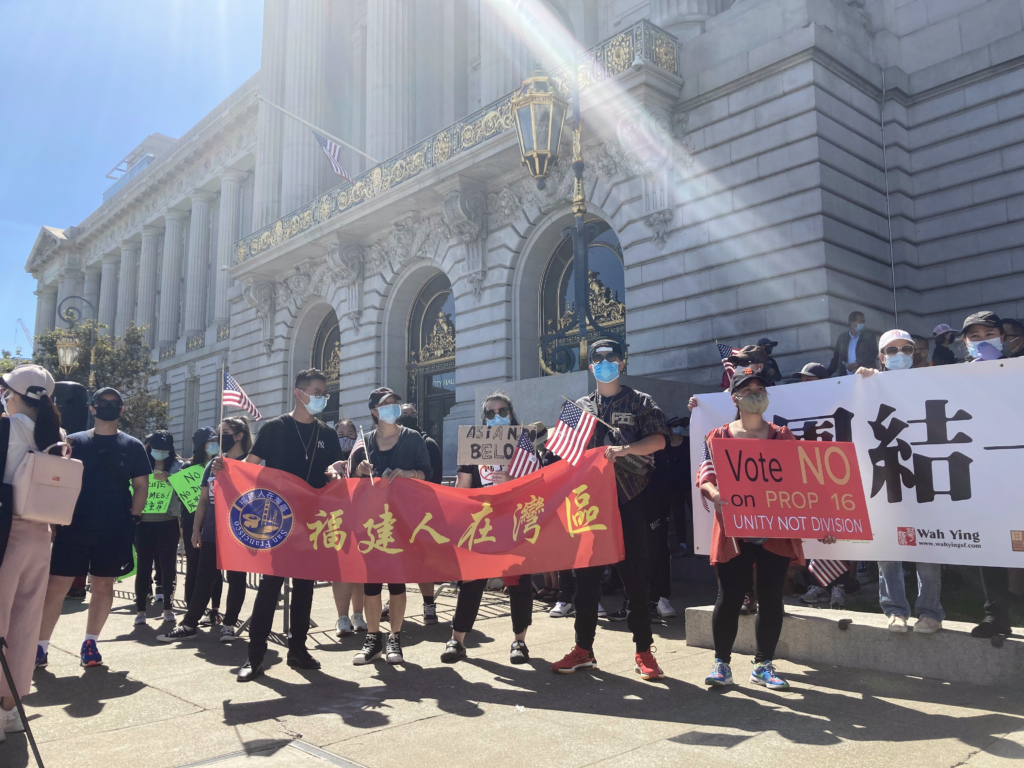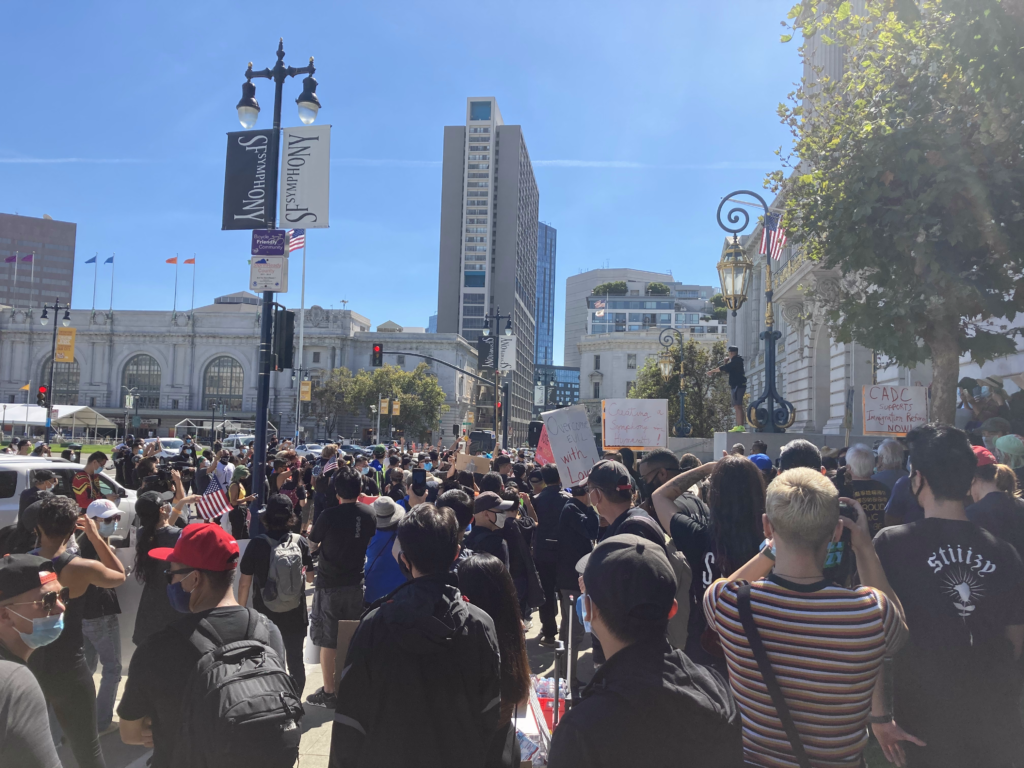The crowd’s anticipation was palpable. As 1 p.m. arrived on Saturday, people of all different backgrounds came together in front of San Francisco City Hall with one purpose: to stand against anti-Asian racism.
Different Asian languages floated through the air, and multiple signs displayed pen strokes that demarcated these languages. People squeezed around a van as the team behind They Can’t Burn Us All, a national movement against anti-Asian hate, passed out free T-shirts that read “Proud AF to be Asian.”
The crowd had gathered more than 600 people by the time They Can’t Burn Us All co-founder and actor Will Lex Ham started speaking. Black Americans shouted out their support for the Asian community, while Latinx and white faces were visible among the crowd. It was clear, though, that Asians held the power today.
A marching snare drum, Chinese lion dancers, and even acrobats—one climbed to the top of a pole in front of the crowd—joined the typical signs, banners, and shirts seen at rallies. More than a dozen referenced Black Lives Matter. The name of Breonna Taylor, a Black medical worker who was killed by police in March, was scrawled across a number of cardboard signs.
The They Can’t Burn Us All movement was Ham and rapper China Mac’s response to an attack in New York City that set an 89-year-old Chinese American woman on fire—one of more than 2,500 reported anti-Asian hate incidents since March. A quarter of these incidents took place in the San Francisco Bay Area, according to a local CBS affiliate.
Ham and China Mac brought the movement to Los Angeles before arriving in San Francisco, where they expected “an incredible experience” because of the city’s “rich history of activism.” The Bay Area is home to the largest Asian population in the continental U.S. Roughly 1 in 5 Bay Area adults was Asian in 2002, according to the U.S. Census Bureau. In Santa Clara County and Alameda County, Asians make up the largest racial group.
San Francisco itself has a sizable Asian American population: 35.8% of 805,235 residents last year. Chinese Americans alone account for 21.2% of the city’s population—San Francisco’s Chinatown, of course, is the oldest in North America and the largest Chinese enclave outside of Asia.
And the Bay Area’s Asian Americans, it was clear, were ready to fight.
As Ham stood on a platform adjacent to the steps to City Hall, protesters moved to occupy the road in front of the building. “Who’s proud as fuck to be Asian?” Ham shouted. The crowd responded loudly in affirmation. A quick show of hands revealed that protesters had come from all over the country—Orlando, New York, Los Angeles—to support the movement in the Bay Area.
Ham's anger rang throughout the street as he railed against the country’s lack of response to anti-Asian racism. San Francisco itself is more than 30% Asian, Ham said, but “they don’t give a shit about us.”
When the attack on the 89-year-old woman was first reported, “nobody made any noise,” Ham recounted. “No one did anything about it … But when we started these marches, that’s when they started paying attention.” This is the first time he has ever seen it in his lifetime, Ham added, Asians uniting to fight together.
Growing up, Ham had been ashamed of being Asian. But “being American is being ourselves … Being American is loving our culture. Loving the color of our skin, loving the features of our face, our eyes, and our mouth and our nose, our brains.”
Though Asian Americans are often used as a wedge between communities, he continued, it’s important to remember their fight was born out of the fight for Black lives. “You can care for Black lives and care for this community at the same time,” he said and thanked Black, brown, and white attendees for standing with Asians. He ended by encouraging Asian Americans to cultivate love for themselves.
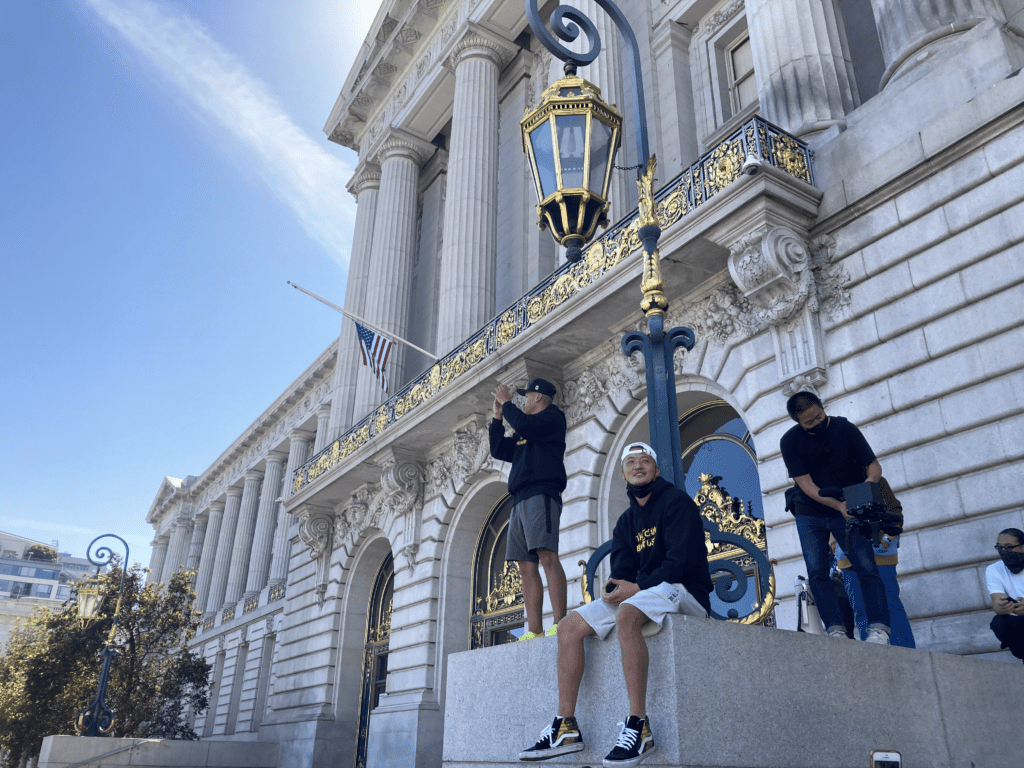

Shawna Chen for The Yappie
China Mac spoke next, sharing that he usually does not cry. Even when he was sentenced to 10 years in prison—for shooting someone in the back—he did not cry. “But lately, I’ve just been crying,” the reformed rapper divulged. “I'm walking through Chinatown, and I see the elderly. I see the people. I see the culture. And I just see the frustration and … the pain. And it's just hard for me not to have my eyes watering.”
“I feel like everybody feels like that right now,” he noted. “Because we are in uncertain times, right? We don't know what's gonna happen tomorrow. We look at our children, and we don't know what their futures are gonna look like. We look at our elderly, and we don't know what's gonna happen. And anytime we walk outside the doors, something may happen to us, or something may happen to our grandmother, grandfather, or our mother or father. I feel like together collectively, we all feel like something has to be done right now.”
Both China Mac and Ham’s voices grew hoarse as they spoke. “If you believe your grandmother should be safe walking in the streets, this is for you,” China Mac said.
He then invited community organizers to speak to the crowd. Before the crowd began marching to Chinatown, organizers made a land acknowledgment in recognition of the Ohlone people and released doves into the air—a symbol for peace.
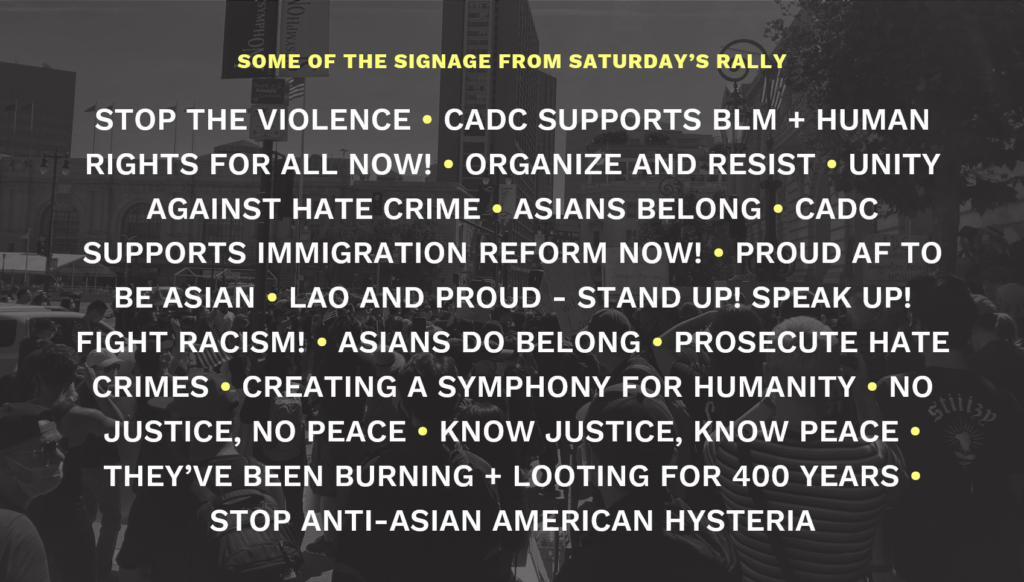

The ‘Us’ in ‘They Can’t Burn Us All
Hundreds of people had gathered in front of City Hall. They cheered wildly and shouted in response to rally speakers, waving signs in the air. Each had their own reasons for attending.
The march was personal for Billy Ong. His sister was attacked on San Francisco’s Clement Street in a Chinese market area. Now in a place that’s supposed to feel like home, racist caricatures are plastered across city walls, while people are seemingly attempting to recreate the initial attack on the 89-year-old woman—by setting two Asian people on fire in Berkeley. “I hope [this march] changes the narrative for young Asian kids—innocent Asian kids—that are potentially getting bullied for this shit, or our elders,” he said, growing emotional. “People who can't defend themselves.”
It would be nice if the government would care, he told me—just “a little bit, you know.” But people have been asking for a long time. “At this point, everything’s gonna burn … It boils down to this,” he emphasized, pointing to the word “HATE” on his sign, which read “HATE IS A VIRUS.” “We’re either gonna do something about it or not." On the back of his sign, he’d written “#BlackLivesMatter” and “#JusticeforBreonna” in addition to the names of other victims of police brutality and military violence.
Chloe Lin and her friends arrived at the rally wearing visors and holding cardboard signs with the words “They Can’t Burn Us All.” She showed up to fight for Chinese Americans’ rights. “Today, it was an old grandma. Tomorrow, it could be the people by our side,” she told me in Mandarin. “So we have to make time to be here. Even if we don’t have time, we have to be here.”
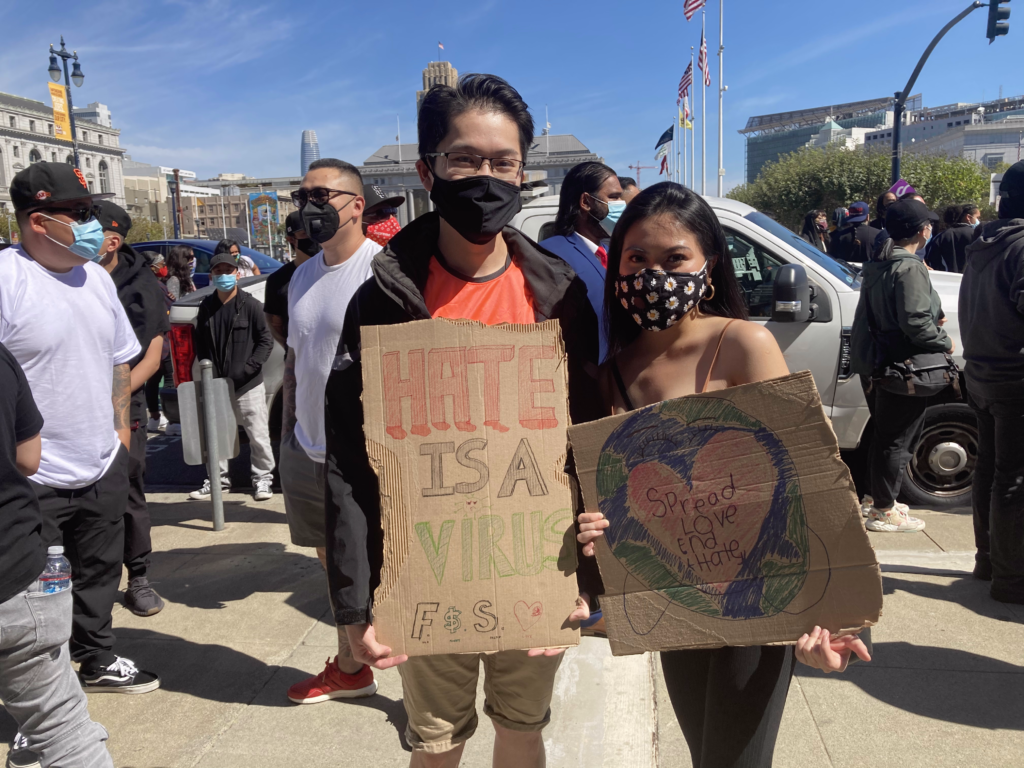

“I hope [this march] changes the narrative for … people who can’t defend themselves.”
—Billy Ong (left)
Anti-Asian racism has a long history in the U.S., with white Americans both employing early Chinese immigrants for cheap labor and inciting Yellow Peril to target Chinese people and businesses for supposedly taking away their jobs. The Chinese massacre of 1871, when 500 white and Hispanic people attacked the Los Angeles Chinatown, led to 17 Chinese deaths by hanging and is considered one of the largest mass lynchings in American history.
Continued hostile sentiment wrote into law the Chinese Exclusion Act of 1882—the first and only federal law to restrict immigration for a specified national group—and resulted in broader restriction of immigration from Asia in the twentieth century. The Supreme Court also decided in 1923 that Indian Americans were ineligible for citizenship, joining other Asian American groups who were denied citizenship at the time. Two decades later, the government called Japanese Americans the enemy during World War II and incarcerated 120,000 Japanese Americans over a four-year period.
For Minh Bui, the rally is “the light at the tunnel that we see.” It’s a movement that’s necessary, she said, building from years and years of oppression. “I'm here, not only because of what happened around the Asian community, but I'm also here because of everyone in our community [of people of color] who face a lot of hate and discrimination,” Bui said. “I feel like we should really do something and be out here and have our voices be heard. And then we can also support everyone through donating, and other actions as well.”
Norm Ten, president of the Asian Pacific American Labor Alliance’s San Francisco chapter, said he marched to support not only rights for Asians but human rights for all. Asian American Pacific Islanders are people, too, and the government needs to recognize that, Ten said. “In the news, you only hear ‘It’s a Black and white issue,’ but trust me, we are all connected … We're dealing with human issues. And so it doesn't matter if you're African American, Hispanic, Asian, Native American, Caucasian. We are all people.”
Federal agencies like the FBI should be doing more to investigate police departments’ lack of response to racist attacks, Stan Lundgreen told me, holding a bright yellow sign that said “UNITY AGAINST HATE CRIME.” He attended the march to support Asian Americans and protest bigotry—such as President Donald Trump’s racist rhetoric, including “kung flu” and “China virus.”
Last week, the House of Representatives passed a resolution 243-164 condemning “all forms of anti-Asian sentiment as related to COVID-19,” including President Trump’s language. The nonbinding measure, spearheaded by Rep. Grace Meng (D-New York), marked the first time the Democratic-led legislative chamber addressed anti-Asian discrimination during the coronavirus pandemic. Only 14 Republicans crossed party lines to support the measure, while all 164 votes against came from GOP members.
“I hope [this march] will make some people safer on the streets, reduce the bigotry somewhat,” Lundgreen said.
Shawna Chen for The Yappie
The rally wasn’t without controversy, though. When an Asian American community organizer spoke her support of Prop. 16 into the mic, some people booed. (California’s Prop. 16 seeks to overturn a ban on affirmative action.) A Black community organizer mentioned a rich history of Asian-Black relationships, noting connections between Jamaican activist Marcus Garvey and Vietnamese Communist leader Ho Chi Minh, and Black Panthers’ use of Chinese Communist leader Mao Zedong’s philosophy. Both political figures remain controversial due to their respective roles in the Vietnam War and Chinese Cultural Revolution.
Early on in the rally, Ham also spoke of belonging to America in terms of place of origin, shouting that “we were born here; we belong here.” Many first-generation Asian Americans who immigrated to the States attended the rally.
All the same, the crowd buzzed with anticipation once speeches concluded. And as Ham and China Mac led protesters on the march to Chinatown, their bodies took up the streets. Their voices echoed through the city. And they refused to be invisible.
“Whose streets? Our streets!”
“No justice, no peace!”
“If we don’t get it, shut it down!”
“Fuck the system! Power to the people!”
“When grandmas get attacked, we stand up, fight back!”
“When Asians get attacked, we stand up, fight back!”
“Show me what community looks like! This is what community looks like!”





